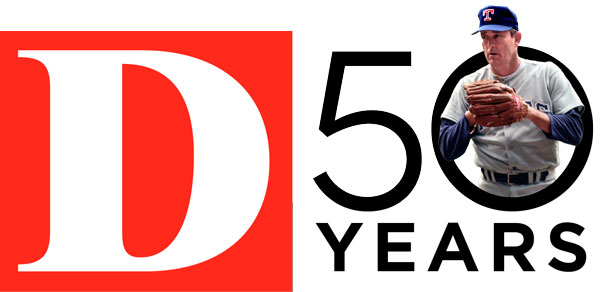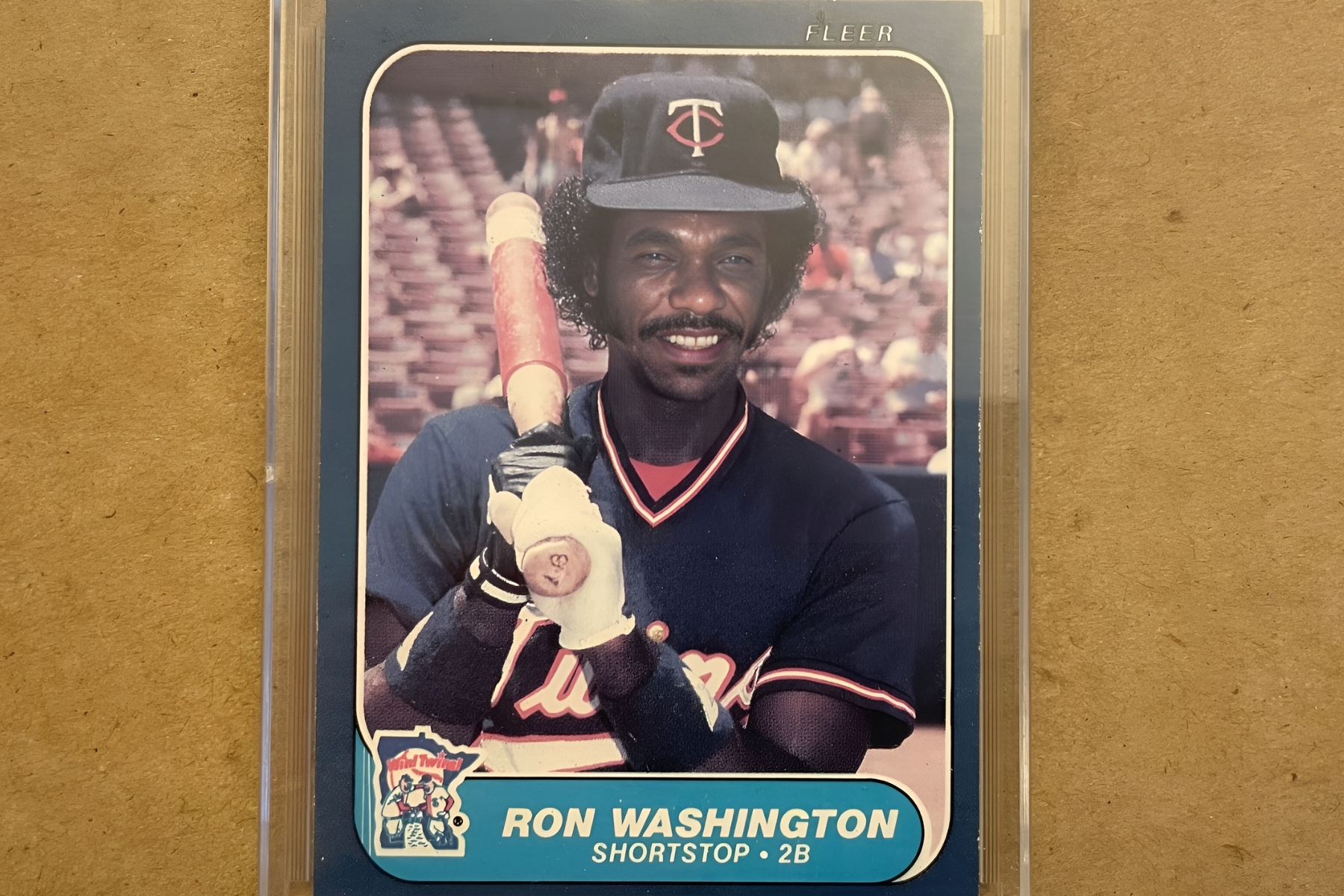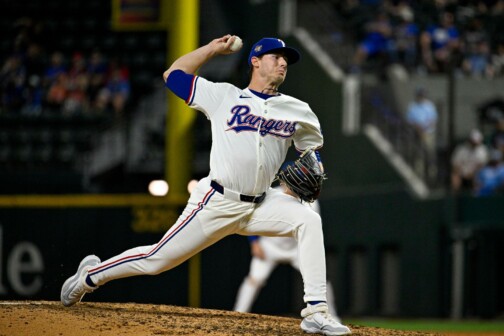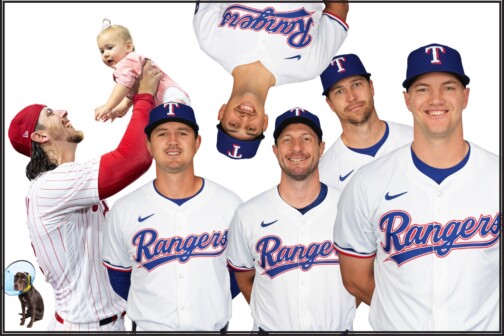The Angels’ spring clubhouse is not large, closer in size to a high school locker room than a big-league dressing space. Ron Washington traverses it slowly. That might be expected of a 71-year-old man, but the new Angels manager does not putter. Clad in a red team hoodie, he’s fresh off the field, where he’d been putting an infielder through his paces. Upon swinging open the clubhouse door, he becomes a social butterfly.
As his players shed t-shirts for jerseys and sneakers for spikes, Washington stops to offer each a hug and a greeting. “Make somebody better,” the manager says as he wraps veteran Aaron Hicks in an embrace. Star outfielder Mike Trout is next in line, offering a “What’s up, Wash!” and a backslap. Washington grins and repeats his mantra: “Make somebody better.”
These environs are new—Washington has little experience with anyone on the roster—but the situation is familiar. Seventeen years earlier, he was in this exact position, hired to manage an American League West underachiever. In 2007, the Rangers had taken a chance on him, a baseball lifer already a bit old to be receiving his first crack at the top job in the game. He more than proved worthy of it, teaching and cheering and excitedly waving home runners from the dugout as the Rangers strung together four straight 90-win seasons and back-to-back trips to the World Series. He made the Rangers better and became a beloved figure in the process.
Then, suddenly and confusingly, it all ended.
Almost 10 years ago, Washington arrived at the Ballpark at Arlington in a business suit instead of his uniform. He hurried through its hallways silently and stone-faced, gathering his players and coaches for an announcement. Through tears, he told them he was resigning, though he offered no explanation. Only two weeks later, at a short but excruciating press conference, did Washington fill in some blanks. He was leaving the team because he’d been unfaithful to his wife, he told reporters, and he needed time to repair the damage he’d caused.
He walked away, leaving both the Rangers and fans in shock.
When he sacrificed the only managerial job he’d ever had, Washington fully intended to land another. He just didn’t know how long it would take. His Rangers tenure had already survived one misstep, a positive cocaine test in 2009, but another dark and opaque cloud had ended it. He didn’t want it to linger, so he threw himself back into coaching and hoped for the best. Over the next several years, he interviewed for two managerial openings, with the Braves and Padres, but came up short both times. As he turned 70, his career as a manager appeared inextricably behind him.
Only Washington never believed that. As team after team hired younger and less experienced skippers, he never doubted his managerial bona fides. “I didn’t leave Texas,” he says now, “because of the Xs and fuckin’ Os.” He could still motivate a team of young men, could still imbue them with his passion for sweating the small stuff. He’d done that in Arlington, helping to transform the Rangers from perennial doormat to juggernaut. He had done it more recently as a coach in Oakland and Atlanta, shaping an all-star assortment of infielders into standout defenders.
The Angels finally gave him that second opportunity, though his hire was met with a measure of skepticism. After all these years, did Washington still have what it takes? Could his unique brand of managerial magic be recaptured a full decade later? Time and the Xs and fuckin’ Os will tell, although just about anyone who knows Washington is sure of the answer. From those he has coached and those he has coached with, from the GM who gave him his first chance to manage to the GM who gave him his second, the refrain is resounding:
Ron Washington has had it the whole damn time.
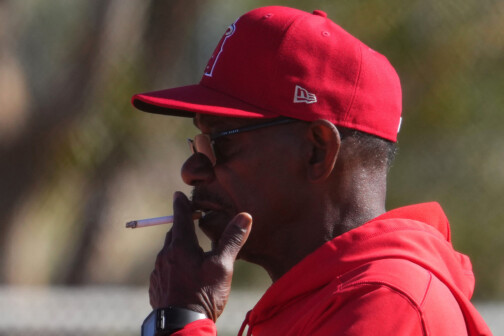
There was a moment early in Washington’s first season with Texas that Jon Daniels knew he’d picked the right man.
Daniels was a young and fresh-faced GM, and in 2007 he plucked Washington from the Oakland coaching staff as his first managerial hire. Washington was upbeat and folksy and had an easy way of connecting with people, but he was also a stickler for detail. His Rangers would play crisp and fundamental baseball, especially on defense, and no mistake would go uncorrected. That approach sometimes chafed others. One night that year, a player—Daniels declines to specify who—“challenged Wash on something” in the middle of a game. Washington, inexperienced as a manager but hardly so in life, reacted evenly.
“He made eye contact with the guy, responded really calmly,” Daniels says, “and the players saw that and were like, ‘OK, he’s in charge.’”
Almost two decades later, Washington doesn’t remember the incident. “That happened quite a few times” in those early seasons, he says. As many Angels have quickly come to appreciate, Washington cares a lot about doing things the right way. “I can tell you right now that if he doesn’t like something that you did, he’s going to come up and tell you about it,” says Hicks. That’s a reputation Washington embraces wholeheartedly. “If you’ve got a group that don’t want to take care of the details, you have a group that’s constantly getting they ass whipped,” he says. “I’m not into that.”
The wizardry of Ron Washington is how he preaches perfectionism without becoming a constant scold. “He gets guys to believe in what he’s teaching,” says Cubs shortstop Dansby Swanson, who came up under Washington’s tutelage while both were with the Braves. Washington doesn’t tell people what to do, says Rangers pitching coach Mike Maddux, “he encourages people to do what they should do.” As a result, Washington engenders a familial loyalty, the vintage depending on the age of the speaker. Former Rangers hitting coach Dave Magadan says playing for Washington “was almost like playing for your dad.” Swanson, with less service time on the planet, goes a generation higher: “He’s almost like everybody’s grandfather.”
However those Rangers teams viewed Washington, they quickly learned to love playing for him. Devoid of megawatt stars, the Rangers went from 83 losses in 2008 to 87 wins in 2009, Washington’s third season. In 2010, thanks to a star turn by Josh Hamilton and the crucial trade-deadline acquisition of Cliff Lee, Texas went 90-72 and zoomed to its first World Series. Amid the rise, Washington and the Rangers confronted their first crisis.
One night over the 2009 All-Star break, Washington used cocaine in what he later swore was a one-time indiscretion. Before he’d even tested positive, he ruefully informed Daniels and team president Nolan Ryan, who decided to keep Washington in the job as he submitted to regular and mandatory drug tests. The incident was kept under wraps from the rest of the organization, but when the news of the incident leaked the following spring, Washington informed his players of his mistake during a closed-door meeting in the clubhouse.
“Five minutes in, there’s hysterical laughter in the room,” says Daniels, who’d been waiting outside. “We walk out and one of the veteran guys has a smile. I’m looking at him like, ‘What happened?’ He said, ‘He told us what happened. We were all worried he had cancer.’ I was like, ‘Huh, I guess we’re going to get through this.’”
The Rangers did more than survive. They thrived. A thrilling run to the franchise’s first World Series in 2010 was followed by an even more dominant season in 2011 and a second trip to the Fall Classic. But a heartbreaking finish to that series—no Rangers fan needs be reminded of the particulars, although last year’s long-awaited title surely dulls the pain—only presaged further disappointments. The 2012 squad won 93 games but fell out of first place on the season’s final day, losing a one-game wild-card matchup soon after. The 2013 team tallied 91 victories but lost a tie-breaking Game 163 to miss the playoffs. In 2014, thanks in large part to injuries, the bottom fell out.
Texas lost 95 games that year, but the Rangers still planned to bring Washington back. That remained true even after Washington confessed his infidelity—a sin, to be sure, although a personal and not professional one—but the manager was resolved to step away. “I certainly didn’t want to see it play out that way,” Daniels says, “but I respected his wishes.” So Washington put on his Sunday best, informed his players he was leaving, and handed the reins to a subordinate.
The entire organization was left numb. “I was as shocked as I’ve ever been in baseball,” says Magadan. No one had seen it coming, and no one knew why it had happened. Immediately, another thought crossed Magadan’s mind. “I thought right away he was probably done,” the hitting coach says. “He was not going to coach again.” Privately, Washington worried that might be the case.
But it’s hard to keep baseball and Ron Washington apart.
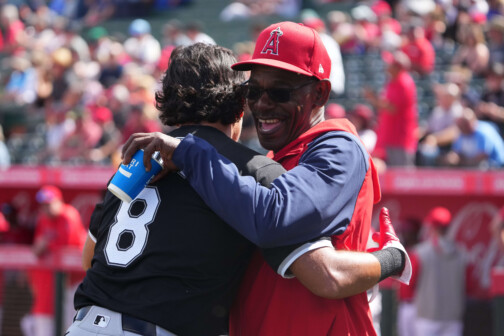
Leaning against a picnic table outside the Angels’ spring training facility one March morning, Washington casts his mind back 10 years. He was worried about his career, yes, but the idea of losing Gerry, his wife since 1972, haunted him far more. “I was scared, dog,” he tells a visitor. “I just knew she was going to leave.” Instead, Gerry stayed, sitting by her husband’s side as he told the world that he’d betrayed her.
For such a private matter, the press conference Washington held two weeks after his departure was a spectacle both painful and necessary for the preservation of his career. In the absence of an explanation for his resignation, speculation began to percolate. With Washington’s blessing, the Rangers had immediately informed reporters that his exit was not related to drugs. Not long after, a report surfaced that he’d resigned due to allegations of sexual assault against a reporter. That claim was never substantiated, but Washington knew if he didn’t address his reasoning, the speculation would fester.
Standing at a podium in a brown suit, Washington read a statement confessing his affair, asked for privacy, and took no questions. Gerry was at his side. Washington has never elaborated on the circumstances of his transgression nor the steps he and Gerry took to heal the wound he caused. But if he was worried that he’d lost baseball and his marriage in one fell swoop, Washington says Gerry’s stoic attendance that day was the first sign that both relationships might endure.
“She loved me, she knew me, she cared about me, so she was willing to sit there with me,” Washington says. “If I’d hurt her so bad that she couldn’t do it, then I’d have been there by myself. But she was there. It was very embarrassing for her. Very embarrassing for her. But she hung behind me, she stayed with me. It was a long time for her to forgive me, but she eventually got there. And it definitely made me a better husband.”
However he and Gerry reconciled, Washington was ready to reenter the game the following summer. In May 2015, he returned to Oakland, where he’d spent 11 seasons on the coaching staff, as a personal defensive guru for Marcus Semien. It was a job suited to his talents although far beneath his experience, but Washington accepted it gratefully. To stay in baseball, he knew he had to really stay in baseball, not sulk at home. “I stayed relevant,” he says. In 2016, he was promoted to third-base coach. Then came his first shot at a second chance to manage.
After the 2016 season, the Braves were looking for a skipper and asked to interview Washington. Atlanta ultimately promoted interim manager Brian Snitker, but the Braves continued to court Washington as a coach. For the first time in their marriage, Gerry made a career decision for her husband. “We spent 17 years on the West Coast,” Washington says. “She was in six earthquakes out there while I was on the road.” Atlanta, meanwhile, was a manageable drive from the couple’s offseason home in New Orleans. You’re going to Atlanta, she told him. “After what I put her through,” he says, “I thought it was best for me to do that.”
Clearly, it was best for everybody. Washington arrived in Atlanta just as the Braves were becoming a National League powerhouse. As the team’s infield instructor, he was gifted with a bumper crop of homegrown infielders to mold into All-Stars—studs including Swanson, Freddy Freeman, Ozzie Albies, and Austin Riley. Before every game, Washington would sit on his knees and feed the players short hops from close distance, a drill that became his trademark. In 2021, five years into his tenure, Atlanta won the World Series, securing Washington his first and only ring.
Life was pretty good, but the itch to manage persisted. Two years before the Braves won it all, Washington had fallen just short of another managing job. Padres GM A.J. Preller, a Rangers alum who had left Texas just weeks before Washington resigned as manager, approached him about leading San Diego in the dugout. Preller instead hired rookie manager Jayce Tingler, only to fire him two years later. Washington insists he has no ill feelings toward Preller, but he also says things would have turned out differently with him at the helm.
“In my mind, he knows I nailed that job,” Washington says. “He just decided to go in a different direction. If he had went in my direction—I mean this from the bottom of my heart—San Diego would have been kicking some ass.”

Kicking ass is now Washington’s mandate in Anaheim, but he faces an uphill battle.
The Angels last made the playoffs 10 years ago, just weeks after Washington stepped away from the Rangers. Since then, they’ve squandered the primes of Trout and Shohei Ohtani, two generational talents. Ohtani is now a Dodger, and Trout, now 32, hasn’t played a full season since 2016. In a stacked A.L. West—the Astros, Mariners, and Rangers all are projected to finish ahead of the Angels—Washington simply may not have the star power or the depth to engineer a quick turnaround. Then again, providing the talent isn’t his job. Getting the most out of it is.
That’s where Washington has always excelled, and it’s why Angels GM Perry Minasian kept coming back to Washington as he sought to fill his managerial vacancy. As a staffer in Texas, Minasian had watched Washington inspire the team to become more than a collection of individuals. Later, as the assistant GM in Atlanta, he’d looked on as Washington coaxed greatness out of player after player. “It takes a little longer for him to stretch” these days, the Angels GM says with a laugh, but Washington hasn’t lost any of that touch. “He’s got a way of motivating everybody to give what they have.”
Already, Washington is leaving his imprint on his new team. Defense is his forte, and to emphasize its importance, he has taken the rare step of having the Angels travel early to road games this spring to conduct infield and outfield drills before first pitch. It’s common to see Washington hitting fungoes to a player before or after team workouts—former Twins infielder Miguel Sanó was a recent pupil—and the manager still has the barrel control to hit a target with a ground ball from 30 paces.
“He’s big on taking that period of time and doing the right stuff, staying sharp,” says Trout, who had dinner with Washington and Freeman earlier in the spring. “That’s key instead of just going through the motions.”
Nor has age dulled what baseball folks would call Washington’s feel. One recent morning, he sat in the dugout nursing a cigarette as his players took batting practice on a back field. After a moment, he called over shortstop Zach Neto, set to enter his second full season in the majors. For a minute or two, Washington probed the young cornerstone with questions, ultimately dismissing him with a fist bump. This was not a lesson but interpersonal bricklaying, one step in the gradual building of a relationship. “He wanted to see how I was doing out of the blue,” the 23-year-old Neto says, “and make sure everything is good.”
It’s a more subtle aspect of managing, and one at which Washington excels. That’s why, despite the shock of his Rangers exit, those who know him well are surprised it took so long for him to get another shot. Daniels believes familiarity is the key. “The way it ended in Texas, people who weren’t close to it probably couldn’t fully wrap their arms around it,” Daniels says. Those who are close to him, though, have clamored to have him near. Beane brought him back to Oakland and Preller went after him in San Diego. Minasian could vouch for him in Atlanta and Anaheim. “The people who know this man can’t wait to employ him,” Daniels says. “People who know Wash are lined up.”
Baseball can be maddeningly unpredictable, but Washington is not. He’ll be at the field before anybody else, ready to drill his infielders. He’ll hug and smile and correct and teach. During games, his face will wear the pains of defeat and the joys of victory for every television camera to see. Sometimes, he’ll speak in the third person. Most of all, he’ll build a culture. “I don’t pretend to know exactly what Anaheim is going to do or how they’re set up,” says Daniels. “But I am confident that he will get the most out of that group.”
Ten years ago, Washington gave it all up to save his marriage, knowing he might never get it all back. It may have taken a decade, but he finally occupies the manager’s seat once more. “The baseball world is right,” says Freeman, “when Ron Washington is managing a team.” Finally, Washington is back where he belongs.
As he might say, that’s how baseball go.
